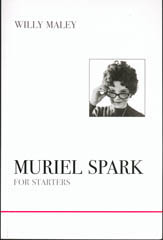Willy Maley
A Cheeky Wee Book
Michael Lister
As far as primers, literary guides or introductions go, this ‘critical caper’ belongs in a class of its own. Contrived to introduce to a new, younger generation the delights of Spark’s oeuvre, it is out of the run-of-the-mill. It almost defies description. Insightful and irreverent, flippant and engaging, incisive and trivialising, it will cause some to belly-laugh, and others to squirm in embarrassment.
 In the space of just over ninety pages and within his eight pithily headed chapters, Maley picks out the main themes from eleven of Spark’s twenty-two novels and discusses them in relation to key events in the novelist’s life. Taking this dual approach, his treatment of the literary alongside the biographical does offer original insights and shows what went to the makings of Spark the writer and the person. There is one weakness, though, and this is in Maley’s presentation of the life.
In the space of just over ninety pages and within his eight pithily headed chapters, Maley picks out the main themes from eleven of Spark’s twenty-two novels and discusses them in relation to key events in the novelist’s life. Taking this dual approach, his treatment of the literary alongside the biographical does offer original insights and shows what went to the makings of Spark the writer and the person. There is one weakness, though, and this is in Maley’s presentation of the life.
Most seasoned readers of Muriel Spark know that despite its great charm, her own memoir Curriculum Vitæ conceals far more than it reveals. Much of the biographical information that Maley presents comes from that most unreliable source which he neither questions nor challenges, taking that which Muriel wrote about herself and her background apparently at face value. And even bearing in mind those that are coming to Spark for the first time, Maley oversimplifies the family background.
For starters, Maley describes Muriel’s mother as being ‘English Presbyterian’. Yet in her memoir, and for reasons best known to herself, Spark asserts that her maternal grandmother’s background was Church of England. If this assertion is true, then while all Anglicans are by definition Protestant, not all Protestants are Presbyterians. Anglicans, by definition, cannot be Presbyterian. Confused? I am. I wonder where Willy Maley takes this information from.
And on the question of Spark’s own religious background, instead of clearing up the confusion, Maley seems to add to it. At one point he writes, ‘if Spark had remained a Presbyterian or embraced her father’s Jewishness
… (surely ‘Judaism’ is meant here), but Muriel Camberg never was a Presbyterian, whether of the Scottish, English or Pagodian Dissenting variety. While young Muriel Camberg’s family was not frum or pious, her parents, who had been married in the East London Synagogue in 1911, were both members of the Edinburgh Hebrew Congregation and did attend synagogue, as published research attests. Perhaps Edinburgh, so steeped in the Reformation spirit, has that unique distinction of being the only place in the world where the offspring of two Jewish parents automatically becomes Presbyterian at birth.
For Maley simply to present Spark in her own words takes us no closer to knowing her. Because with Spark, ‘what you see is what you get’ don’t obtain. There is always much, much more to this writer than meets the eye. The one thing that some readers of Spark have come increasingly to know is that ‘what you think you see actually isn’t there!’ This, I would say, applies to some of Spark’s writing as much as it applies to some aspects of her life. And the earlier that Spark debutants are introduced to the complicated biographical material, the better able they will appreciate the complexities of her life.
But this is not to write off Maley, or his book. Perhaps in his research, he found it impossible to access or make use of certain types of sources that would have helped finally disambiguate this vexed question about Spark, but faute de mieux had to rely on Curriculum Vit
æ as the principal source.
There are a few points I would raise: despite the alliterative charm, Muriel was not from Morningside, she was born in Bruntsfield. Notwithstanding what Derek Stanford in his 1963 Muriel Spark: A Biographical and Critical Study reported about how much longer than was usual Muriel was suckled, in Rhodesia Muriel did not have a black nanny called Esther, her young son Robin had. And Maley’s claim that Spark’s ‘success was marred to some extent by a very public spat with her son’ (over the question of her Jewish identity), is not convincing. Perhaps he meant that the spat damaged her reputation. And if it did, it has not been to the extent that has caused her books to be put on the Index Librorum Prohibitorum, or today’s secular equivalent.
Willy Maley’s Muriel Spark for Starters is a cheeky wee book. I’m sure it will attract new starters to Spark and bring about increased sales of Spark’s novels that in turn will bring much joy and pecuniary advantage to the executors of the Spark literary estate. May her novels remain in print ever!
Muriel Spark for Starters by Willy Maley is published by Capercaillie Books. ISBN 9781906220242. £9.99
© Michael Lister

Comments